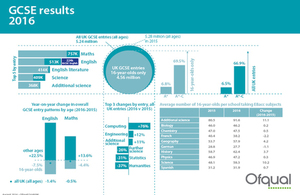A guide to GCSE results, summer 2016
A summary of GCSE results in 2016

GCSE results
Key points
- Outcomes for 16-year-old students at grades A* to C for English, English literature and mathematics have remained stable between summer 2015 and summer 2016 when combined across GCSE and level 1/2 certificate qualifications (also known as international GCSEs)
- Entries for 16-year-old students increased in the majority of other EBacc subjects in summer 2016. On average, schools tended to enter more 16-year-old students for EBacc subjects in summer 2016 compared to summer 2015
- In general, results for 16-year-old students in the majority of Ebacc subjects tended to be lower in summer 2016 than in summer 2015. This appears to be due to an increase of less able students taking EBacc subjects in summer 2016
Summary
The number of entries for all subjects this summer is relatively stable at 5.3 million. The number of entries from 15 year-old students continues to decline and those from post-16 students continue to increase.
For all students across the UK:
- The proportion achieving A* is down 0.1 percentage points to 6.5%.
- The proportion achieving A* and A is down 0.7 percentage points to 20.5%.
- The proportion achieving A* to C is down 2.1 percentage points to 66.9%.
- The proportion passing (A* to G) is down 0.2 percentage points to 98.4%.
These outcomes reflect changes in the makeup of the overall cohort – in terms of the number of entries and overall ability – but looking at 16 year-old students only generally shows a pattern of stability.
Although the overall entry numbers appear to be stable, in some subjects there has been considerable change in entry patterns. This is likely to be due to schools changing their approaches to teaching and exam entry in response to policy changes, such as those to performance tables to count only the first entry, and the requirement that students who do not achieve a grade C in English or mathematics must continue to study those subjects. As a result, making comparisons between overall results in summer 2016 and results in summer 2015 is of limited value.
We have published separately details of year-on-year variation at individual schools/college level in selected subjects, a summary of our summer monitoring activity, which includes details of the out of tolerance awards, and a more detailed analysis of selected subjects.
We have also today published an infographic.